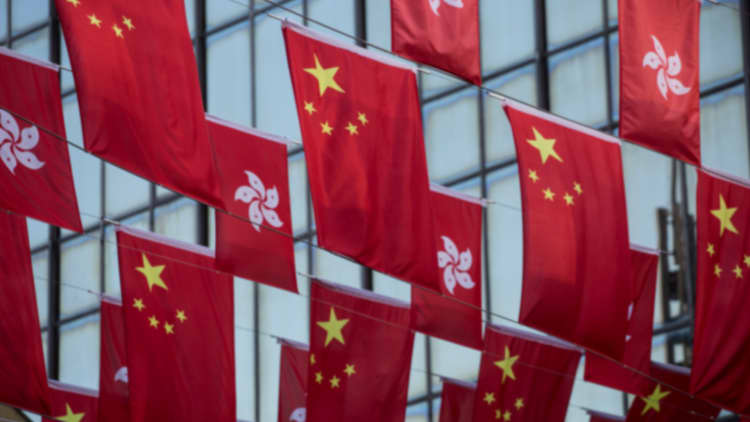Western luxury labels will need to demonstrate that they are good Chinese citizens in the face of territorial sensitivities, according to an expert on branding in the region.
Fashion brands including Givenchy, Coach and Versace apologized last week when some Chinese social media stars canceled their endorsement deals after text on some of their T-shirts suggested that places such as Hong Kong are separate countries from mainland China.
The apologies came as protests in Hong Kong snowballed into a broader pro-democracy movement, with some activists even demanding full autonomy from Beijing.
But David Wolf, a partner at Allison + Partners who helps multinational companies expand into China, warned that apologies from the luxury brands may not be enough for Chinese people who have "deep patriotic pride."
"The more sensitive this whole territorial issue becomes, the more challenging the trade issues become between China and the rest of the world, the more that these brands are going to have to kowtow, if you will, and so they should be thinking very creatively about what they can do to demonstrate that they're good, if you will, Chinese citizens, without at the same time alienating some of their other audiences in territories elsewhere in the world," he told CNBC by phone.
Wolf added that luxury brands have a difficult balance to make in appealing to consumers, regardless of where they live or their cultural preferences. "It is extraordinarily difficult for these brands to do two things at once, which is first to understand what those sensitivities are, cultural and political around the world, to tiptoe around all those, and at the same time maintain the edginess that's required of a fashion brand. That's a very hard road to walk."
Along with apologizing, Wolf said the fashion labels should "do something to visibly make amends" in the coming fashion season.
Chinese supermodel Liu Wen, a brand ambassador for Coach, owned by Tapestry, said on Weibo she had severed her endorsement deal with the American brand over a T-shirt, which listed Taiwan as a country. Jackson Yee, a singer with Chinese boy band TFBoys, said he was no longer working with Givenchy, the LVMH-owned brand, after one of the band's world tour T-shirts referred to "Hong Kong, Hong Kong," and "Macau, Macau."
Wolf suggested that the Chinese brand ambassadors were also protecting themselves.
"These spokespeople, if they want to continue operating in China, they want to maintain themselves in the good graces of the Chinese government … so they have to make sure that they're not associated with brands that take lightly issues that China takes seriously, like territorial integrity," Wolf said.
A warning to brands
"China approaches these issues using the old saying 'kill one to save a hundred.' But what they're trying to do is set an example, they're sending a warning not just to these brands but to all brands, to say 'listen guys, you have to be extremely careful here. You cannot be seen to be supporting any sort of separatism within what China perceives as its territorial boundaries'," he added.
@TFBOYS_THFANS: #Qianxi #JacksonYee #TFBOYS Studio Update [易烊千玺JacksonYee工作室]
China is a key market for luxury goods makers, with Chinese people accounting for a third of all global spending, although a weaker yuan will make imported goods more expensive. Meanwhile, luxury apparel businesses Prada, Hugo Boss and Gucci parent company Kering all said the protests in Hong Kong had an impact on sales, in their most recent earnings calls.
Demonstrators in Hong Kong have been protesting for the past few months over a bill that would allow people in Hong Kong accused or convicted of committing a crime against China to be extradited to the mainland. Hong Kong Chief Executive Carrie Lam suspended the bill last month but has not officially withdrawn it. Last Monday, its airport canceled all flights after four days of demonstrations and on Thursday Hong Kong's government said it had lowered its GDP growth forecast.
In 2018, China appeared to increase its policing of how overseas companies refer to territories such as Hong Kong and Macau, both of which are Chinese territories but run with a high degree of autonomy.
For Wolf, Chinese companies are also likely to have a difficult time expanding globally and in working out how they deal with territorial issues. "The interesting conversations I'm having are with Chinese brands right because they're extraordinarily pressed. They don't know what to do, if they don't say anything, they come across to their growing foreign clientele as if they're just, essentially tools of the Beijing government," he said.
"If they do say something, obviously they're going to get censored at home and there's things like jail waiting for executives ... if they fall out of line. So it's as much a challenge for Chinese brands going global as it is for global brands that are getting into China."


